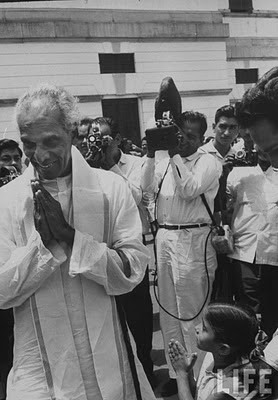Harrison sees the ghost and shoots the horse
I have no idea how engineering is related to madness.While reading History,I have noted that two great engineers who worked in India became mad towards the end of their life.Another one,a police officer became mad while in action.Policemen tend to be mad at times,but here it was complete madness,he was mentally ill.All the three were British.Most of the readers will be surprised when they hear the names because they are well known.Sir Robert Bristow,architect of Cochin Port,Sir Gordon Risley Hearn,architect of Khyber Pass Railway and Superintendent of Malabar Special Police(MSP) Harrison.
 |
| Bristow |
Bristow had a mission.The trade at Cochin port had increased.The port was with the British since 1795, but nothing was done to develop it.Ships were still anchored in deep sea for offloading cargo.Willingdon asked Bristow to construct an approach channel for the ships to enter the inner harbor.This would help the ships from being exposed to the violent sea.
 |
| Gertrude |
His wife Gertrude was denied entry in the elite Cochin Club because she was not English born.So she was instrumental in forming the Lotus Club,the first non-English Club in Kerala which became elite later.She was President of the Club for 10 years from 1931.
Bristow returned to England on 13 April 1941.He served at Manchester University before madness conquered him.He wrote Cochin saga before that.Bristow didn't have children.His nephew,Timothy John Bristow(Bristow's brother Robert Anthony's son) visited Cochin on April 21,2014.
 |
| Gordon Hearn |
After the third Afghan war in 1919,the British feared a Russian invasion of India from Khyber.It is a 23 mile pass in the Northwest of Pakistan beginning near the village Qadam tread by Buddha,stretching to Torkham,35 miles Northwest of Peshawar.It is a narrow treacherous cleft in the Sulemea Range of Hindukush Mountains.It is an ancient caravan route.
The British thought that the Russians could be blocked if a railway line was in place in the Khyber Pass.The assignment thus for Hearn was to connect the Pass to Indian railway network or to extend the line from Peshawar-Jamrud to Afghan border at Torkham.The Pass already had a road suitable for motor transport and an aerial rope way was constructed using surplus parts from World War I.Hearn suggested a broadguage line.Victor Bayley,Senior engineer was in charge of the actual construction.The construction of the first phase was completed in record time and opened on November 2,1925.It was the line from Jamrud to Landikotal.The total length of the line would have been 42 Kilometers till the Afghan frontier.But considering the objection of Afghanistan,the section to Landikhana was closed on December 15,1932.So the line didn't cross the Afghan border.
There are four stations in the line,Jamrud,Shagai,Landikotal and Landikhana.34 tunnels, 92 bridges and culverts.Total length of the tunnels is three kilometers.The cost was 60 lakhs.Ultimately the line didn't boost trade or traffic.The Pakistan Railways ran a free weekly passenger service till 1982 to prove to the fierce tribesmen that they are the bosses.After that it made way to Khyber Steam Safari.
For Hearn,it was a dream not realized.He went back to England to encounter madness.He had written two books:The Seven Cities of Delhi(1906) and Railway Engineer's Field Book with A G Watson.Maybe the second book is useful for E Sreedharan!
 |
| Hearn's Book |
K.Anandan Nambiar(1918-1991)was the General secretary of the Union.After finishing studies in Malabar Christian College,he had joined the Workshop as a fuel clerk in 1938.Within three years,at 24,he became General Secretary.He was elected to the Madras Legislative Assembly from the railway constituency in 1946,defeating the Congress candidate by 20,000 votes.
 |
| Bristow's book |
"It is me,Nambiar",Nambiar came out.
The Police pushed him.He fell down.Harrison touched him with the bayonet."Shoot",Harrison screamed.
"Sir",Sergeant Raman Nair intervened,"he is dead sir,we should not fire at a dead body."
Nambiar survived.Police fired at the crowd.Four workers,M Raju,R Ramachandran,M Thyagarajan and C Thankavelu were killed.
Harrison became mad after the firing.Hysterical,he saw the ghost of Nambiar on several nights. On one night he saw a moving shadow outside the home.He fired at the shadow,screaming,"Nambiar,Nambiar!".His white horse fell down dead.
I do not know what happened to Harrison afterwards.His had been a haunting story from my childhood.I am yet to see a picture of him.
The story of Nambiar is well known.He was the first communist MLA in Madras.He defeated the Railway Minister Santhanam in 1952 Parliament elections in Mayiladuthurai.He was elected to the Loksabha again in 1962 and 1967 from Tiruchirapally.He attended the May day celebrations in Beijing in 1952.He became Treasurer of AITUC in 1954.He had been in the Party Central Committee from 1953.He stepped down as DREU President in 1990.
 |
| Pak locomotive at Shagai |
Babu Paul had invited Mrs Leela Marar on a republic day to the Port.I spoke to Babu Paul now-Marar used to raise from the sea riding a black horse on new moon Fridays after his death and beat the security person with a cane if he was asleep in the old building.Leela had told Babu Paul that Marar was fond of horse race and he wished to buy a black horse.I asked Babu Paul whether it was a hallucination.He was confused.
But Harrison?He was afraid of ghosts.We don't know whether Nambiar believed in ghosts.His gurus,Karl Marx and Engels did,because they had begun The Communist Manifesto thus:A Spectre is haunting Europe;the Spectre of Communism.Two ghosts in a single sentence!
Reference:
1.Communism in India/ Gene D Overstreet &Marshall Windmiller/University of California Press,1959
2.Permanent way Through the Khyber/Victor Bayley/Beacon Library,1939
3.Nothing But:The Long Road to Freedom/Brigadier Samir Bhattacharya
4.Nakshatravum Chuttikayum/Ramachandran
5.Cochin Saga/Bristow/Cassel,1959
6.Katha Ithu Vare/D Babu Paul/DC Books,2008





























